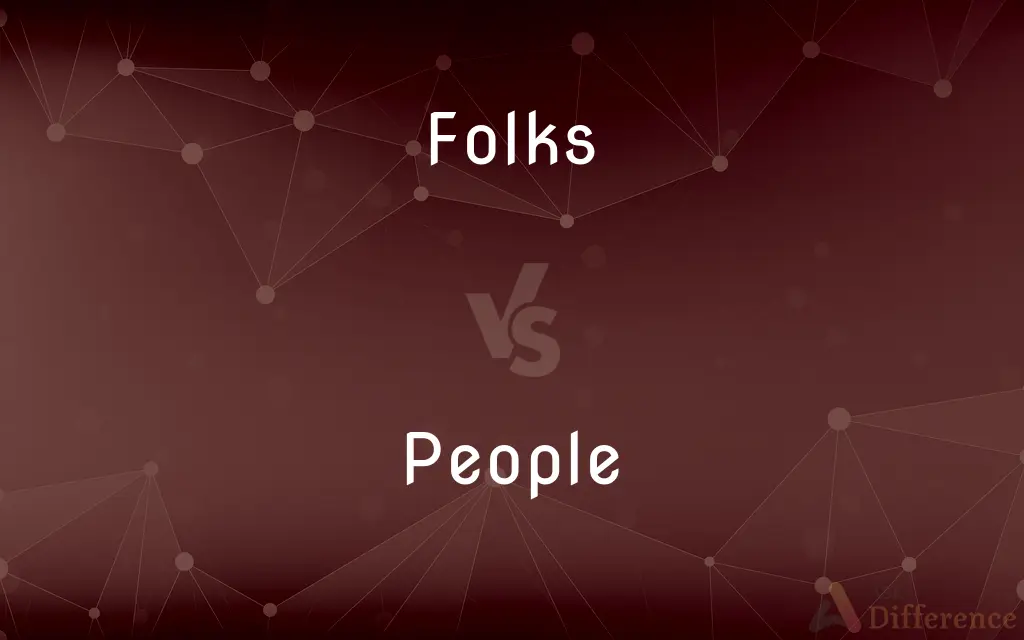Folks vs. People — What's the Difference?
By Tayyaba Rehman — Updated on October 16, 2023
Folks generally refer to family or a specific group, while people often refer to a larger, more general group. Both denote groups of individuals.

Difference Between Folks and People
Table of Contents
ADVERTISEMENT
Key Differences
Folks often carries a familial or colloquial tone, suggesting warmth or intimacy. When someone says "How are your folks?" they are typically asking about someone's family. People, on the other hand, is more neutral and can be used to describe any group of individuals without implying a specific relationship.
Folks can be utilized to address a particular audience, like "Listen up, folks!" suggesting camaraderie or a collective spirit. People, while it can also be used in a similar manner, usually implies a broader group, often devoid of personal connection.
In regional dialects and colloquialisms, folks can take on varied nuances. For instance, in the American South, it's common to use "folks" to refer to parents. People maintains its general meaning across most dialects, signifying a group without specific connotations.
Folks is often used to describe a group with shared characteristics or backgrounds, like "city folks" or "country folks". People might be used in the same way but tends to be more generic and expansive, such as "the people of the city" or "people from the country".
While folks can often bring about a sense of nostalgia or regional pride, it can sometimes be seen as informal. People remains a standard term for groups in both formal and informal contexts.
ADVERTISEMENT
Comparison Chart
Connotation
Familial, specific group.
Neutral, broad group.
Usage
More informal and colloquial.
Standard in both formal and informal contexts.
Scope
Often smaller, known groups.
General, larger groups.
Regional Variations
Can change meaning in dialects.
Remains consistent in meaning.
Relationship Implication
Implies closer relationship.
Doesn’t necessarily imply a relationship.
Compare with Definitions
Folks
Members of a particular community or group.
The folks at the church are organizing an event.
People
The members of a particular nation, community, or ethnic group.
The indigenous people of that region have rich traditions.
Folks
Relatives, especially parents.
I'm visiting my folks this weekend.
People
Persons forming a group.
A group of people gathered at the park.
Folks
People in general.
Folks around here are friendly.
People
The human beings constituting a particular group.
The people responsible will be held accountable.
Folks
The common people of a society or region considered as the representatives of a traditional way of life and especially as the originators or carriers of the customs, beliefs, and arts that make up a distinctive culture
A leader who came from the folk.
People
A people is a plurality of persons considered as a whole, as is the case with an ethnic group, nation or the public of a polity.
Folks
(Archaic) A nation; a people.
People
Human beings in general or considered collectively
The earthquake killed 30,000 people
People think I'm mad
Folks
Folks(Informal) People in general
Folks around here are very friendly.
People
The members of a particular nation, community, or ethnic group
The native peoples of Canada
Folks
Often folks People of a specified group or kind
City folks.
Rich folk.
People
The supporters or employees of a person in a position of power or authority
I've had my people watching the house for some time now
Folks
One's parents
My folks are coming for a visit.
People
(of a group of people) inhabit (a place)
An arid mountain region peopled by warring clans
Folks
The members of one's family or childhood household; one's relatives.
People
Humans considered as a group or in indefinite numbers. Often treated as a plural of person, alone and in compounds
People were dancing in the street. I met all sorts of people. This book is not intended for laypeople.
Folks
Of, occurring in, or originating among the common people
Folk culture.
A folk hero.
People
The mass of ordinary persons; the populace. Used with the
"those who fear and distrust the people, and wish to draw all powers from them into the hands of the higher classes" (Thomas Jefferson).
Folks
Plural of folk
People
A body of persons living in the same country under one national government; a nationality.
Folks
Your parents;
He wrote to his folks every day
People
The citizens of a political unit, such as a nation or state; the electorate. Used with the.
Folks
A group of people with shared characteristics.
City folks don't understand country life.
People
Pl. peo·ples A body of persons sharing a common religion, culture, or language
The peoples of central Asia.
Folks
An informal address to a group.
How are you folks doing today?
People
Persons with regard to their residence, class, profession, or group
City people.
Farming people.
People
Persons subordinate to or loyal to a ruler, superior, or employer
The manager would like to introduce you to our people in the regional office.
People
A person's family, relatives, or ancestors
Where are your people from?.
People
(Informal) Animals or other beings distinct from humans
Rabbits and squirrels are the furry little people of the woods.
People
To settle or inhabit with people; populate.
People
To be present in or on (a place)
"The stores ... are peopled by serious shoppers" (Perri Klass).
People
Used as plural of person; a body of human beings considered generally or collectively; a group of two or more persons.
There were so many people at the restaurant last night.
People
(countable) Persons forming or belonging to a particular group, such as a nation, class, ethnic group, country, family, etc.
People
A group of persons regarded as being employees, followers, companions or subjects of a ruler.
People
One's colleagues or employees.
People
A person's ancestors, relatives or family.
My people lived through the Black Plague and the Thirty Years War.
People
The mass of a community as distinguished from a special class (elite); the commonalty; the populace; the vulgar; the common crowd; the citizens.
People
Plural of person.
People
(transitive) To stock with people or inhabitants; to fill as with people; to populate.
People
(intransitive) To become populous or populated.
People
(transitive) To inhabit; to occupy; to populate.
People
To interact with people; to socialize.
People
The body of persons who compose a community, tribe, nation, or race; an aggregate of individuals forming a whole; a community; a nation.
Unto him shall the gathering of the people be.
The ants are a people not strong.
Before many peoples, and nations, and tongues.
Earth's monarchs are her peoples.
A government of all the people, by all the people, for all the people.
People
Persons, generally; an indefinite number of men and women; folks; population, or part of population; as, country people; - sometimes used as an indefinite subject or verb, like on in French, and man in German; as, people in adversity.
People were tempted to lend by great premiums.
People have lived twenty-four days upon nothing but water.
People
The mass of community as distinguished from a special class; the commonalty; the populace; the vulgar; the common crowd; as, nobles and people.
And strive to gain his pardon from the people.
People
One's ancestors or family; kindred; relations; as, my people were English.
People
To stock with people or inhabitants; to fill as with people; to populate.
As the gay motes that people the sunbeams.
People
(plural) any group of human beings (men or women or children) collectively;
Old people
There were at least 200 people in the audience
People
The body of citizens of a state or country;
The Spanish people
People
The common people generally;
Separate the warriors from the mass
Power to the people
People
Members of a family line;
His people have been farmers for generations
Are your people still alive?
People
Fill with people or supply with inhabitants;
People a room
The government wanted to populate the remote area of the country
People
Make one's home or live in;
She resides officially in Iceland
I live in a 200-year old house
These people inhabited all the islands that are now deserted
The plains are sparsely populated
People
Human beings in general.
People need water to survive.
People
The public or community at large.
The people have spoken.
Common Curiosities
Is "people" singular or plural?
"People" is typically plural, but can be singular when referring to a distinct group, like "a people".
Can "folks" be used to address a group?
Yes, "folks" can be an informal address to a group.
Is "folks" informal?
"Folks" is often viewed as more informal than "people".
Can "people" refer to a nation's citizens?
Yes, "people" can refer to the members of a particular nation or community.
Are there any idiomatic uses of "people"?
Yes, e.g., "people person" meaning someone sociable.
Which is more formal, folks or people?
"People" is generally considered more formal than "folks".
Are folks and people synonyms?
Yes, they can be, but "folks" often has a more specific or familial connotation.
Do "folks" and "people" have the same origin?
No, "folks" originates from Old English "folc", and "people" from Latin "populus".
Is "folks" used to refer to parents?
In some regions, "folks" is a colloquial term for parents.
How are "folks" used in different regions?
Its meaning can vary, e.g., in the American South, it often refers to parents.
Can "folks" imply a close relationship?
Yes, "folks" can imply a closer relationship than "people".
Can both words be used in official documents?
While both can be used, "people" is more common in official contexts.
Which word is older, folks or people?
"Folks", from Old English, predates "people" from Old French.
Can "folks" and "people" be used interchangeably?
Often, yes, but context and nuances can dictate which is more appropriate.
Is it correct to say "peoples" for multiple ethnic groups?
Yes, "peoples" can be used to refer to distinct groups within a larger population.
Share Your Discovery

Previous Comparison
Drunk vs. Drunkard
Next Comparison
Prego vs. PreggoAuthor Spotlight
Written by
Tayyaba RehmanTayyaba Rehman is a distinguished writer, currently serving as a primary contributor to askdifference.com. As a researcher in semantics and etymology, Tayyaba's passion for the complexity of languages and their distinctions has found a perfect home on the platform. Tayyaba delves into the intricacies of language, distinguishing between commonly confused words and phrases, thereby providing clarity for readers worldwide.













































